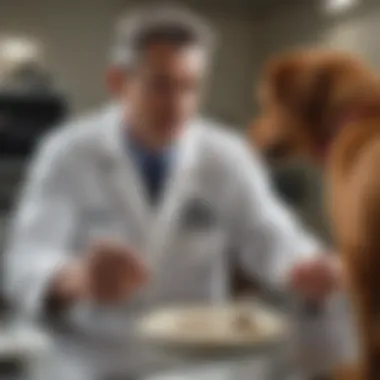Effective Dietary Solutions for Dog Diarrhea Relief


Intro
Diarrhea is a common issue faced by dogs, and it can stem from a variety of causes. This condition can be distressing for both the pet and the owner. Understanding the right approach to handling it is essential. This section discusses appropriate dietary choices, signs indicating when to seek veterinary care, and key information to assist in your pet's recovery.
Understanding Your Pet
Having a clear understanding of your dog and its unique characteristics can aid in discerning the root cause of diarrhea and how best to address it.
Breed Traits
Different breeds may have varying sensitivities to certain foods. For example, breeds like German Shepherds or Cocker Spaniels can be more prone to gastrointestinal issues. It's important to consider these traits when assessing your dog's health.
Common Temperaments
Dogs display a range of temperaments. Anxiety or stress, sometimes seen in breeds like Border Collies or Shih Tzus, can lead to digestive disturbances. Observing your pet's behavior can help in managing their condition more effectively.
Special Needs
Some dogs require special diets due to allergies or medical conditions. For such pets, the appropriate dietary options during diarrhea must be selected very carefully. Consulting with your veterinarian can provide clarity on special needs for your dog.
Nutrition and Feeding Guidelines
When a dog suffers from diarrhea, selecting the right foods is critical. Here are some general guidelines:
- Bland Diet: Start with a bland diet that includes boiled chicken (without skin) and white rice. This can soothe the stomach.
- Pumpkin: Canned pumpkin (not the spiced pie filling) can be beneficial. It adds fiber and can help firm up the stool.
- Electrolytes: Maintaining hydration is key. Offer oral electrolyte solutions made for dogs if they refuse to drink water.
Health and Wellness
Regular routines can minimize the likelihood of future digestive episodes.
- Ensure access to fresh water to prevent dehydration.
- Maintain a consistent feeding schedule.
- Monitor for any unusual behavior, as it may indicate underlying issues.
Keeping these essentials in mind can foster better overall health for your dog.
When to Seek Veterinary Care
Recognizing when a dog's diarrhea requires professional help is vital. Symptoms that warrant a visit to the veterinarian include:
- Persistent diarrhea lasting more than a day.
- Blood in the stool.
- Vomiting alongside diarrhea.
- Signs of lethargy or unwillingness to eat.
Assessing these symptoms early can prevent severe health issues down the line.
Ending
Caring for a dog with diarrhea demands attention to dietary details, an understanding of individual needs, and the awareness of warning signs signaling when to consult a vet. By taking appropriate measures, you can help your dog recover swiftly and return to their normal activities.
Understanding Canine Diarrhea
Understanding canine diarrhea is essential to ensuring the health and well-being of dogs. Diarrhea is not merely a transient issue; it can be a symptom of an underlying concern. Recognizing the causes, symptoms, and potential risks associated with diarrhea helps pet owners act promptly and effectively.
A clear grasp of this condition allows for better dietary management and choice of appropriate remedies. Additionally, understanding canine diarrhea enables dog owners to monitor their pet's health more proactively. Being aware of the various factors that contribute to diarrhea can save time and resources, potentially preventing more severe health repercussions down the line.
Common Causes of Diarrhea in Dogs
Diarrhea in dogs can arise due to various factors, some of which may require straightforward home remedies, while others might indicate a need for veterinary care. Common causes include:
- Dietary indiscretion: Dogs are naturally curious. They might eat something harmful or unsuitable for their digestive system, leading to gastrointestinal disturbances.
- Infections: Bacterial, viral, or parasitic infections can disrupt the gut's normal function, causing diarrhea.
- Food intolerances or allergies: Some dogs may have reactions to specific ingredients in their diet. Identifying these can help alleviate symptoms and inform dietary adjustments.
- Medications: Certain medications can lead to diarrhea as a side effect. It is pertinent to monitor any new drug usage closely.
- Stress: Changes in environment, such as moving or introducing a new pet, can affect a dog's digestive system. Keeping track of stressors can aid in understanding diarrhea's origin.


Symptoms Associated with Diarrhea
Recognizing the symptoms associated with gastrointestinal upset is vital for timely intervention. Common symptoms include:
- Frequent, loose stools: This is the most apparent sign of diarrhea. Owners should observe the frequency and consistency.
- Vomiting: Occasionally, diarrhea may accompany vomiting, which can indicate more serious conditions.
- Lethargy: A decrease in energy levels or unusual tiredness may signal a dog’s distress and should not be overlooked.
- Changes in appetite: A sudden lack of interest in food can indicate discomfort or illness.
- Dehydration: Signs such as dry gums, excessive thirst, or decreased urine output should be monitored closely.
Potential Risks of Diarrhea
While infrequent diarrhea might not be a justified cause for concern, persistent episodes can pose significant risks to a dog's health. Among the primary dangers of untreated diarrhea are:
- Dehydration: Significant fluid loss can lead to dehydration, which might necessitate medical intervention, particularly in younger or older pets.
- Electrolyte imbalance: Diarrhea can cause a loss of essential minerals and electrolytes, affecting various bodily functions and potentially leading to further complications.
- Malnutrition: Ongoing diarrhea can result in nutrient loss. This can interrupt a dog’s normal growth and development if not addressed.
- Underlying health issues: Continuous diarrhea might indicate more serious health conditions, such as pancreatitis or intestinal diseases, requiring further medical evaluation.
Being aware and informed about canine diarrhea can lead to better preventive measures and a swift response, ultimately helping maintain a dog’s health.
Immediate Dietary Adjustments
Immediate dietary adjustments are crucial when addressing diarrhea in dogs. A dog's digestive system is sensitive, and the right food can help restore balance. Diet plays a vital role in managing diarrhea, as some foods can exacerbate the condition. Adjusting a dog's diet can reduce irritation in the gastrointestinal tract and promote recovery.
Prologue to a Bland Diet
A bland diet serves as a preliminary step in addressing diarrhea. The main goal is to provide easily digestible foods that are gentle on the stomach. This approach reduces stress on the digestive system while ensuring the dog receives adequate nutrition. Typically, a bland diet includes simple ingredients which help to firm up stool consistency. This can be especially important for dogs experiencing frequent or watery stools.
By introducing a bland diet, pet owners can alleviate symptoms before considering further intervention. The simplicity of this diet aids in recovery and helps to identify if a specific food might be causing the issue.
Recommended Bland Food Options
Incorporating bland food options can significantly aid in managing diarrhea. Here are some specific choices:
Boiled Chicken
Boiled chicken is a popular choice for dogs with diarrhea. It is low in fat and easy to digest. The key characteristic of boiled chicken is its high protein content, which is essential during recovery. It's beneficial because it provides the nutrients dogs need without stressing the digestive system.
One unique feature of boiled chicken is that it can be prepared quickly and served in manageable portions. However, pet owners should ensure that the chicken is boneless and skinless to avoid any choking hazard or added fats that may further irritate the dog's stomach.
White Rice
White rice is another staple in a bland diet for dogs. It is a simple carbohydrate that helps bind the stool. Its key characteristic is that it is very gentle on the digestive system, making it a frequent recommendation by veterinarians. White rice offers a source of energy, which is particularly important if the dog has been eating less due to illness.
The unique feature of white rice is its ability to absorb excess liquid in the intestines. However, it’s worth noting that it should not be the only food given, as it lacks certain nutrients necessary for a balanced diet.
Plain Pumpkin
Plain pumpkin is often overlooked but it has several benefits when managing diarrhea. The high fiber content in pumpkin aids in regulating bowel movements. It is particularly beneficial as it can help firm up loose stools. The key characteristic of plain pumpkin is its natural composition, which includes both soluble and insoluble fiber. This combination can support a healthy digestive system.
One unique feature of plain pumpkin is its versatility; it can be mixed with other bland foods like boiled chicken or white rice. However, pet owners should avoid using pumpkin pie filling, which contains added sugars and spices that could irritate the dog's stomach.
When dealing with diarrhea, always consult with a veterinarian if symptoms persist, as they can provide tailored advice on dietary choices.
In summary, these dietary adjustments can help support your dog's recovery from diarrhea. A bland diet with options like boiled chicken, white rice, and plain pumpkin can provide the necessary care during this time.
Hydration Considerations
Ensuring proper hydration is a vital part of managing diarrhea in dogs. Diarrhea can lead to significant fluid loss, which may cause dehydration if not properly addressed. Keeping your dog well-hydrated supports recovery and overall health.
Importance of Water Intake
Water is essential for every living creature, and dogs are no exception. When diarrhea occurs, your dog's body loses not only electrolytes but also valuable fluids. This loss can lead to dehydration, which can complicate the existing problem and make recovery slower.
Here are some key points regarding water intake for dogs suffering from diarrhea:


- Frequent Offerings: Dogs may not drink water on their own when they feel unwell. It is crucial to offer fresh water multiple times throughout the day to encourage them to hydrate.
- Monitoring Consumption: Keep an eye on how much water your dog is drinking. If they refuse water or drink very little, this can be a red flag, and you may need to explore additional options for hydration.
- Signs of Dehydration: Look for signs such as reduced skin elasticity, dry mouth, or lethargy. These indicate the need for immediate intervention, possibly requiring veterinary care.
Commercial Remedies for Diarrhea
Diarrhea in dogs can often be alleviated through various commercial remedies available in the market. These remedies are critical as they provide a quick and effective response to help manage your dog's symptoms. They usually work by restoring balance in the gut, providing necessary nutrients, and reducing discomfort caused by diarrhea. It’s essential to choose the right product and understand its specific benefits and considerations.
Over-the-Counter Options
Over-the-counter remedies are easily accessible and can be an efficient way to support your dog's recovery from diarrhea. Products such as Pepto-Bismol or Imodium are known for their efficacy in treating digestive issues. However, it's crucial to consult your veterinarian before administering any human medications to your dog. The following products are commonly recommended:
- Probiotics: These promote healthy gut bacteria, which can help normalize your dog's digestion.
- Anti-diarrheal medications: These can provide quick relief and reduce the frequency of bowel movements.
- Electrolyte solutions: These solutions help to replenish lost nutrients and combat dehydration.
Always follow dosing instructions for any commercial product. Misuse can lead to further complications.
Probiotics and Their Benefits
Probiotics are live microorganisms that provide health benefits. They are particularly beneficial for dogs experiencing diarrhea. Supplementing with probiotics can help restore the natural balance of gut flora disrupted by various factors such as stress or dietary changes. Here are some key benefits to consider:
- Improved digestion: Probiotics aid in breaking down food and enhancing nutrient absorption.
- Reduced diarrhea duration: Probiotic use often leads to shorter episodes of diarrhea, allowing for a quicker return to normal bowel habits.
- Support for the immune system: A healthy gut flora can contribute to a stronger immune response, helping your dog avoid further illness.
Incorporating probiotics into your dog's diet may involve using powders or specific probiotic-enhanced foods. Consider products like FortiFlora or Elixirs for Pet Probiotics as viable options. Always consult your veterinarian for tailored advice regarding probiotic supplementation.
When to Seek Veterinary Care
Understanding when to seek veterinary care for your dog experiencing diarrhea is crucial. Many pet owners may think that diarrhea is a minor issue, something that will resolve itself within a couple of days. However, the underlying causes may be more complex and require professional intervention. Identifying the right moment to consult with a veterinarian can prevent further complications and support your pet's recovery effectively. This section details specific signs that may indicate it is time to visit a veterinarian and outlines the diagnostic tests that could be necessary.
Signs Indicating a Veterinary Visit
There are various signs that indicate a trip to the veterinarian is warranted. It’s essential to monitor your dog's symptoms closely. Here are the most important factors to consider:
- Duration of Diarrhea: If diarrhea persists for more than 24 hours, it’s crucial to seek veterinary advice. Persistent diarrhea may lead to dehydration and other severe health issues.
- Presence of Blood: Noticing blood in your dog’s stool is always a cause for concern. It can signal hemorrhagic gastroenteritis or other serious conditions.
- Vomiting: When diarrhea is accompanied by vomiting, it signifies a more serious problem. The combination can exacerbate dehydration and requires prompt care.
- Lethargy: If your dog seems unusually tired or unresponsive, it may suggest that they are not faring well.
- Change in Appetite: A significant drop in appetite or refusal to eat should also prompt a veterinary visit.
"Timely veterinary care minimizes risks associated with severe digestive issues, ensuring timely treatment and recovery."
- Abdominal Pain: If your dog appears to be in pain or discomfort, this warrants immediate attention.
- Age and Health Status: Puppies, older dogs, or dogs with pre-existing health issues should always be taken to the vet sooner rather than later.
Diagnostic Tests for Determining Underlying Issues
If you end up needing veterinary assistance, your vet will likely perform several tests to determine the root of your dog’s diarrhea. These may include:
- Fecal Examination: A fecal test can identify parasites, bacteria, or other abnormalities in the digestive tract. It is a first-line test for unexplained diarrhea.
- Blood Tests: Bloodwork helps in assessing your dog's overall health status and can identify infections, organ function issues, and more.
- X-rays or Ultrasound: Imaging can reveal obstructions, tumors, or other structural problems in the abdomen.
- Endoscopy: In some cases, direct visualization of the intestines may be needed to obtain tissue samples or check for abnormalities.
By understanding the signs and knowing when to seek veterinary care, you can enhance your dog’s chances of a swift recovery from diarrhea. Prompt and informed action can significantly contribute to your pet's overall health and well-being.
Long-term Dietary Management
Long-term dietary management is crucial for dogs recovering from diarrhea. A well-balanced diet helps restore their health and prevents further gastrointestinal disturbances. It is essential to ensure that the diet is adjusted not only based on recovery but also on the dog's long-term nutritional needs. Pet owners must pay close attention to what their dogs consume, as certain foods can act as triggers for recurrent diarrhea.
A balanced diet aids in sustaining overall health, contributing to stronger immune function and better digestion. By providing appropriate nutrients, pet owners can reduce the likelihood of future digestive problems. Moreover, a dog's dietary requirements may change with age, activity level, and health status, so regular assessments are key.
Benefits of Long-term Dietary Management:
- Promotes overall health and vitality.
- Reduces the risk of food-triggered diarrhea.
- Supports digestive health.
- Enhances nutrient absorption and gut health.
An ideal feeding plan should be personalized to each dog's preferences and any known sensitivities. Consultation with a veterinarian is advisable to achieve the best balance between nutrition and health risks.
Establishing a Balanced Diet
Establishing a balanced diet for your dog can make a significant difference in promoting long-term health. This approach involves selecting high-quality food that contains the right proportions of protein, carbohydrates, fats, vitamins, and minerals. The right balance varies for different dog breeds and their specific needs.


When choosing food, consider:
- High-Quality Proteins: Ensure that protein sources are easily digestible, such as chicken or fish. These support muscle health and overall energy.
- Complex Carbohydrates: Include ingredients like sweet potatoes or oatmeal, which provide sustained energy and are less likely to irritate the digestive tract.
- Healthy Fats: Omega-3 and Omega-6 fatty acids are important for skin and coat health.
- Fiber Sources: Fiber aids digestion. Look for food that includes pumpkin or brown rice for fiber support.
Use the following guidelines to ensure a balanced diet:
- Check for AAFCO certification on dog food labels to ensure it meets nutritional standards.
- Gradually introduce new foods to avoid digestive upset.
- Monitor your dog’s weight and adjust portion sizes accordingly.
Identifying Food Allergies
Identifying food allergies is a vital aspect of long-term dietary management. Some dogs may develop sensitivities or allergic reactions to specific ingredients, leading to gastrointestinal upset, including diarrhea. Recognizing these allergies can prevent discomfort and future health issues.
Common Symptoms of Food Allergies:
- Frequent diarrhea or soft stools
- Vomiting
- Itchy skin or ear infections
- Chronic gas or bloating
To identify potential allergies, consider the following steps:
- Elimination Diet: This involves removing common allergens such as beef, dairy, and wheat from the diet for a period to see if symptoms improve.
- Food Trials: Introduce one new food ingredient at a time and monitor for reactions.
- Veterinary Testing: Consult a veterinarian for allergy testing if necessary.
Once food allergies are identified and eliminated from the diet, make sure to choose alternative protein and carbohydrate sources carefully. Look for hypoallergenic dog food that contains limited ingredients to minimize the risk of future reactions. Regular monitoring and adjustments are key to maintaining a comfortable and healthy diet for your dog.
Remember, addressing food allergies promptly can significantly enhance your dog's quality of life.
Monitoring Your Dog’s Recovery
Monitoring your dog’s recovery after an episode of diarrhea is very crucial for ensuring their overall health and well-being. Diarrhea can lead to dehydration and may indicate underlying health issues. By keeping track of various factors, pet owners can not only gauge the effectiveness of the care provided but also identify any potential complications early on.
Tracking Changes in Behavior and Stool
The first step in monitoring your dog's recovery is being observant of their behavior and stool consistency. Noticing small changes can be vital. Key aspects to observe include:
- Frequency of Defecation: How often is your dog going outside? Increased frequency can indicate unresolved issues.
- Stool Appearance: Is the stool returning to a normal firmness and color? A healthy stool should be formed, brown, and not contain any mucus or blood.
- Energy Levels: Is your dog acting like its usual self? Lethargy can be a sign that further veterinary care is needed.
- Appetite: A dog regaining its appetite is usually a positive sign, but a lack of interest in food should be noted.
Monitoring these changes helps you understand if your dog is improving or if symptoms are persisting.
Maintaining a daily log can assist in tracking these factors effectively. This allows for a clear view of your dog's progress and aids in discussions with veterinary professionals if needed.
When to Reintroduce Regular Diet
Deciding when to return your dog to its regular diet is a critical step in their recovery. Reintroducing normal food too soon can risk further digestive issues. Here are considerations to make:
- Duration of Recovery: Wait for at least 24 to 48 hours after the diarrhea has resolved before considering a return to a standard diet.
- Gradual Transition: Start with small amounts of the regular food mixed with the bland diet for a few days, assessing how well your dog tolerates it.
- Observation During Transition: Keep an eye on your dog's stool output and overall behavior as you reintroduce normal food.
Once the regular diet is fully reintroduced, continue to monitor for any return of symptoms or changes in behavior. If vomiting or diarrhea returns, it is advisable to consult a veterinarian without delay.
By carefully monitoring your dog’s recovery, you ensure they receive proper care and help them return to optimal health efficiently.
Preventative Measures for Future Incidents
Preventing diarrhea in dogs is a crucial aspect of responsible pet ownership. While it's important to know how to manage diarrhea when it happens, taking steps to prevent it can help alleviate suffering for your pet and reduce stress for you. Understanding the importance of routine checks and establishing a healthy feeding routine can significantly decrease the likelihood of digestive issues.
Importance of Routine Checks
Routine checks play a vital role in maintaining your dog's overall health. Regular health assessments can help identify any underlying problems before they develop into serious issues. These checks may include monitoring your dog's weight, examining their coat and skin for signs of trouble, and paying attention to any changes in behavior or bathroom habits.
Noticing subtle changes early can be preferable than dealing with acute situations. A dog that suddenly has diarrhea may already be exhibiting a range of symptoms days or weeks prior, such as decreased energy or changes in appetite. By being proactive in these assessments, you can ensure your dog remains in optimal health. It's also a good idea to schedule routine veterinary appointments annually.
Establishing a Healthy Feeding Routine
A consistent and appropriate feeding routine is essential for digestive health. Proper nutrition supports a dog’s immune system and helps prevent gastrointestinal disturbances. Here are some considerations for establishing an effective feeding regimen:
- Choose high-quality dog food that meets your dog’s specific nutritional needs. Avoid switching foods frequently, as this can upset their stomach.
- Establish a regular feeding schedule. Dogs thrive on routine, and knowing when to expect meals can promote a healthier digestive process.
- Monitor treats and snacks. Overindulging your dog with too many treats or table scraps can lead to digestive upset.
- Gradually introduce any new food items. Sudden changes to diet can cause stress to the gastrointestinal tract.
In summary, ensuring a healthy feeding routine along with regular checks can significantly minimize the chances of diarrhea in dogs. Awareness and action can prevent such situations from occurring in the first place, promoting overall well-being in your pet.



